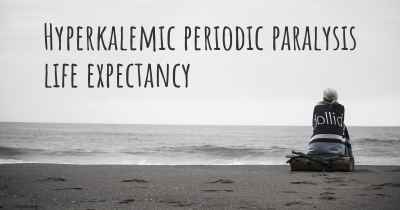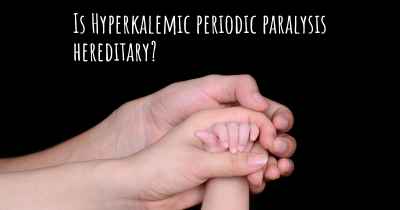Which are the symptoms of Hyperkalemic periodic paralysis?
See the worst symptoms of affected by Hyperkalemic periodic paralysis here

Hyperkalemic periodic paralysis (HYPP) is a rare genetic disorder that affects the muscles and is characterized by episodes of muscle weakness or paralysis. It is caused by a mutation in the gene responsible for regulating sodium channels in muscle cells. This mutation leads to an abnormal influx of sodium into the cells, which disrupts the normal electrical activity and function of the muscles.
The symptoms of HYPP typically manifest during childhood or adolescence and can vary in severity and frequency from person to person. The most common symptom is muscle weakness or paralysis, which can affect various muscle groups in the body. The weakness or paralysis can be temporary and may last for minutes to hours, or in some cases, it can persist for days.
During an episode of HYPP, individuals may experience muscle stiffness or twitching before the weakness or paralysis sets in. This can be accompanied by tingling or numbness in the affected muscles. The weakness or paralysis is often fluctuating, meaning it can come and go or vary in intensity throughout the episode.
HYPP episodes can be triggered by a variety of factors, including exercise, stress, high-potassium foods, fasting, or certain medications. These triggers can cause a rise in potassium levels in the blood, exacerbating the symptoms of HYPP.
Other symptoms that may occur during an episode of HYPP include fatigue, muscle cramps, and difficulty breathing. In severe cases, individuals may also experience respiratory muscle weakness, which can lead to respiratory distress and require immediate medical attention.
It is important to note that not all individuals with HYPP will experience the same symptoms or have the same triggers. Some individuals may have mild symptoms that are easily managed, while others may have more severe and frequent episodes that significantly impact their daily lives.
Diagnosis of HYPP is typically made through a combination of clinical evaluation, medical history, and genetic testing. A thorough physical examination may reveal characteristic findings such as muscle hypertrophy (enlargement) or myotonia (prolonged muscle contraction). Genetic testing can confirm the presence of the specific mutation associated with HYPP.
Treatment for HYPP focuses on managing symptoms and preventing or minimizing the occurrence of episodes. This often involves lifestyle modifications, such as avoiding triggers like high-potassium foods and excessive exercise. Medications may also be prescribed to help regulate potassium levels or reduce the frequency and severity of episodes.
Prognosis for individuals with HYPP varies depending on the severity of symptoms and the effectiveness of treatment. With proper management, many individuals with HYPP are able to lead relatively normal lives and participate in regular activities. However, it is important for individuals with HYPP to work closely with their healthcare team to develop a personalized treatment plan and monitor their condition regularly.
In conclusion, Hyperkalemic periodic paralysis is a rare genetic disorder characterized by episodes of muscle weakness or paralysis. The symptoms can vary in severity and frequency, with muscle weakness or paralysis being the most common symptom. HYPP episodes can be triggered by various factors and may be accompanied by muscle stiffness, twitching, tingling, or numbness. Prompt diagnosis and appropriate management are crucial in effectively managing the condition and improving the quality of life for individuals with HYPP.








